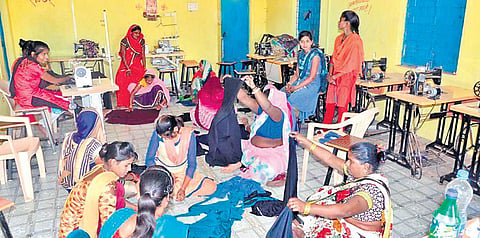

Rashi Anand saw kids begging on the road for the first time in her life when she arrived in Delhi in 2004 to do her graduation. She had never seen this in Ranchi, where she was born and brought up, and she wanted to do something for these children. From here, the idea of Lakshyam took birth.
After graduating from Khalsa College (Delhi University) in 2007, Rashi did her Masters in marketing and event management and started her own event management company, Mirage. She then began collecting funds for Lakshyam through events, and sought donations from family and friends.
The NGO was formally registered in 2012. With centres spread across the country, Lakshyam now has a team of 18 core members and around 200 volunteers from India and abroad.
To turn the NGO into a self-sustainable entity, Anand has launched two social projects — Travel for Change on volunteer tourism and Holy Cow Lakshyam, which involves making of products from cow dung and urine.
“Both of these generate funds so that we can be self-sustainable even if we don’t get donors,” says the 34-year-old.
The first project
It was with street kids from the slums in and around Vasant Kunj. I began teaching these kids but it was a failure. One, because the kids were a floating population and second, their mothers asked for money. As a 22-year-old girl, I faced lewd remarks from alcoholic men in the area. I had to abandon it. Then I thought of setting up a toy and books library for kids. I went to public schools and asked students to donate these, and set up our first library in a Vasant Kunj JJ cluster. The project closed down after five years, but gave me a lot of on-ground experience to handle the community.
On ground projects
Lakshyam has three programmes. First is Lakshyam Toy Library that took off in 2011. With the help of local NGOs, we have been able to set up 17 toy and book libraries across India under this. The second project, Butterfly, involves child education and development. Here, we identify kids involved in rag-picking and child labour and give them remedial education and then enroll them in government schools. The third one, Rooh, is about women empowerment, where we make women financially literate and impart two skills — stitching and phenyl/manure making from cow dung and urine.
Umri project
As a part of Rooh, we did this in association with IRCON International Ltd. We were given Shivpuri district, we surveyed all the 13 villages before zeroing in on Umri. We ran the project for a year (Oct 2019-Oct 2020), and empowered 60 women, who now earn around Rs 4,000 per month. After every four months, we do an end-line survey to assess the ground reality. We maintain a database of women we have worked with and give them orders at regular intervals. During the lockdown, we got an order for 25,000 masks which was completed by the women associated with us in Ghaziabad.
New projects
The first, Rooh programme in Nahar Kota, is a replication of the Umri project. The second is at Sindhi Basti, Vasant Kunj, which has slum women comprising migrants from Haryana. Traditionally potters, they make clay toys and kitchen utensils. We noticed they had to sell cheap Chinese toys as there was no market for clay articles. We identified two toys, dugdugi and damru, and are now redesigning these with the help of students from Pearl Academy so that they are sellable in the market.
Online teaching
We were unsuccessful with our online classes in August, due to shortage of computers. So we began collecting old laptops and mobile phones, and since September we have been holding online classes successfully. At the Ghaziabad centre, 31 (of 83) students are in attendance while in Vasant Kunj, 27 attend.